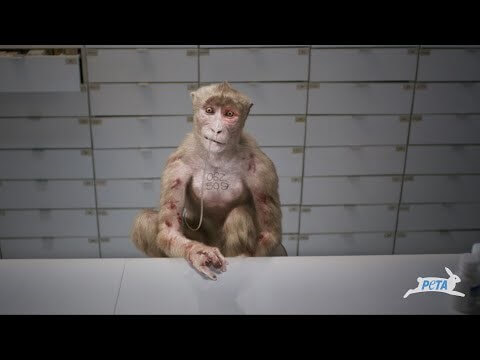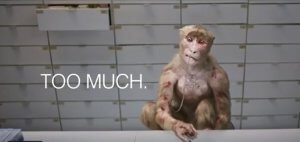The post GVT 2023 DON Image Only appeared first on PETA.
‘Too Graphic’: San Antonio TV Stations Run Controversial PETA Ad Aimed at Monkey Laboratory
Because experiments on monkeys at the Southwest National Primate Research Center (SNPRC) are so gruesome that no TV station could possibly air them, PETA used CGI to create a controversial new ad that reveals—without showing any real animals, gore, or blood—who pays the real price for pharmaceutical drugs tested on animals. Though the spot was rejected by TV stations across the country—calling it “too graphic” and citing probable “viewer complaints”—it’s currently running on local stations in San Antonio.
In the 15-second video, a “customer” wants to know how much a prescription will cost—and a computer-generated monkey, tattooed with an ID number as real monkeys in laboratories are, wheezing through a breathing tube, and missing parts of several fingers, like the monkey at the SNPRC whose fingers had to be amputated due to staff carelessness, has the answer: “Too much.”
“If a computer-generated monkey is ‘too much’ for TV, imagine how consumers would react to seeing real footage from the SNPRC’s laboratories, where monkeys are caged, mutilated, tormented, and killed for pointless experiments that don’t benefit human health,” says PETA Senior Vice President Kathy Guillermo. “PETA is rallying viewers to stand up against these real-life horrors and join us in calling on the SNPRC to pivot to sophisticated, human-relevant research methods.”
Even though studies show that 90% of all basic research—most of which involves animals—fails to lead to treatments for humans, the SNPRC is still imprisoning and tormenting more than 2,500 primates for experiments. Ninety-five percent of new medications that test safe and effective in animals fail in humans.
Another PETA-produced video, this one targeting the dairy industry, will confront moviegoing families at a local cinema. In it, a computer-generated calf chained up behind a shop’s cash register and swarming with flies reveals that a wedge of cheese costs “too much.” The calf is ear-tagged with the name and number of an actual calf in a photograph sent to PETA by a whistleblower at Daisy Farms near Paris, Texas. The group’s subsequent undercover investigation revealed that despite the dairy company’s claims to the contrary, cows crammed inside massive, filthy sheds were kicked, whipped, or jabbed and calves were separated from their mothers just after birth and force-fed, one fatally.
PETA’s monkey video will run 34 times on FOX affiliate KABB and NBC affiliate WOAI through December 18, and the calf video will be seen more than 1,500 times at AMC Rivercenter 11 through December 22.
PETA’s motto reads, “Animals are not ours to experiment on, eat, wear, use for entertainment, or abuse in any other way.” For more information, please visit PETA.org, listen to The PETA Podcast, or follow the group on X (formerly Twitter), Facebook, or Instagram.
The post ‘Too Graphic’: San Antonio TV Stations Run Controversial PETA Ad Aimed at Monkey Laboratory appeared first on PETA.
‘Too Much!’: New PETA CGI Ad Aimed at UW-Madison Primate Center to Air Locally
Because “Madtown” is home to the notorious Wisconsin National Primate Research Center at the University of Wisconsin–Madison, PETA is running this ad on local airwaves that asks viewers to consider the deathly high stakes for animals suffering in laboratories. In the 15-second spot, a “customer” wants to know how much a prescription will cost—and a computer-generated monkey, tattooed with an ID number and wheezing through a breathing tube, has the answer: “Too much.”
“Monkeys are caged, mutilated, tormented, and killed in laboratories for pointless experiments that don’t benefit human health,” says PETA Senior Vice President Kathy Guillermo. “PETA is rallying viewers to stand up against these horrors and join us in calling on UW-Madison to pivot to sophisticated, human-relevant research methods.”
Even though studies show that 90% of all basic research—most of which involves animals—fails to lead to treatments for humans, UW-Madison’s primate center still imprisons and torments more than 2,400 monkeys for experiments. A six-month PETA undercover investigation revealed that monkeys were held in barren cages and bleak windowless rooms and were so traumatized by extreme long-term confinement that they ceaselessly circled their tiny cages and pulled out their own hair.
PETA’s ad will run on local FOX affiliate WMSN during the 9 p.m. news a dozen times through December 4. PETA is also airing the ad on stations in San Antonio, Texas, where the Southwest National Primate Research Center is located.
Numerous advertisers in several cities, including Indianapolis; Reno, Nevada; and San Diego, refused to run the spot, deeming it “too graphic,” even though it doesn’t feature real animals, gore, or blood.
PETA’s motto reads, “Animals are not ours to experiment on, eat, wear, use for entertainment, or abuse in any other way.” For more information, please visit PETA.org, listen to The PETA Podcast, or follow the group on X (formerly Twitter), Facebook, or Instagram.
The post ‘Too Much!’: New PETA CGI Ad Aimed at UW-Madison Primate Center to Air Locally appeared first on PETA.
‘Too Controversial’: TV Station Blocks PETA CGI Video Aimed at Charles River Laboratories
Because experiments on animals at Charles River Laboratories, which has a facility in San Diego, are so gruesome that no TV station could possibly air them, PETA used CGI to create a new video that reveals—without showing any actual animals, gore, or blood—who pays the real price for pharmaceutical drugs tested on animals. But the FOX affiliate in San Diego is still refusing to run even this PG-rated animated video, calling it “too controversial” and “graphic in nature.”
In the 15-second spot, a “customer” wants to know how much a prescription will cost—and a computer-generated monkey, tattooed with an ID number and wheezing through a breathing tube, has the answer: “Too much.”
“If a computer-generated monkey is ‘too much’ for TV, imagine how consumers would react to seeing real footage from Charles River Laboratories, where animals are caged, mutilated, tormented, and killed for pointless experiments that don’t benefit human health,” says PETA Senior Vice President Kathy Guillermo. “PETA is rallying viewers to stand up against these real-life horrors and join us in calling on Charles River to pivot to sophisticated, human-relevant research methods.”
Even though drugs that appear safe and effective in animal studies fail 95% of the time in humans, Charles River continues to imprison and torment animals for pharmaceutical and other tests. Charles River experiments on more monkeys—16,460 in 2022 alone—than any other company in the U.S. It’s under civil and criminal investigation for alleged illegal monkey smuggling.
While the local FOX affiliate has refused to run the video, ABC San Diego will run it seven times this week during the morning and evening news and during Good Morning America.
PETA’s motto reads, “Animals are not ours to experiment on, eat, wear, use for entertainment, or abuse in any other way.” For more information, please visit PETA.org, listen to The PETA Podcast, or follow the group on X (formerly Twitter), Facebook, or Instagram.
The post ‘Too Controversial’: TV Station Blocks PETA CGI Video Aimed at Charles River Laboratories appeared first on PETA.
VIDEO: Nude ‘Monkeys’ Crash Harvard-Yale Football Rivalry
The post VIDEO: Nude ‘Monkeys’ Crash Harvard-Yale Football Rivalry appeared first on PETA.



